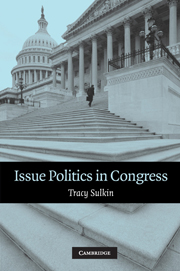Book contents
- Frontmatter
- Contents
- List of Figures
- List of Tables
- Acknowledgments
- Issue Politics in Congress
- 1 Electoral Challenges and Legislative Responsiveness
- 2 A Theory of Issue Uptake
- 3 The Nature of Campaign and Legislative Agendas
- 4 Assessing Uptake
- 5 Who Responds? Explaining Individual Variation in Uptake
- 6 Patterns of Responsiveness in Congress
- 7 The Electoral Impacts of Uptake
- 8 Uptake and Public Policy
- 9 Elections, Governance, and Representation
- Appendix: House and Senate Samples
- References
- Index
3 - The Nature of Campaign and Legislative Agendas
Published online by Cambridge University Press: 08 January 2010
- Frontmatter
- Contents
- List of Figures
- List of Tables
- Acknowledgments
- Issue Politics in Congress
- 1 Electoral Challenges and Legislative Responsiveness
- 2 A Theory of Issue Uptake
- 3 The Nature of Campaign and Legislative Agendas
- 4 Assessing Uptake
- 5 Who Responds? Explaining Individual Variation in Uptake
- 6 Patterns of Responsiveness in Congress
- 7 The Electoral Impacts of Uptake
- 8 Uptake and Public Policy
- 9 Elections, Governance, and Representation
- Appendix: House and Senate Samples
- References
- Index
Summary
Issue agendas, both in campaigns and in Congress, lie at the core of the theory of uptake. Most fundamentally, these agendas serve as the focal point for assessing issue linkages between campaigns and legislative activity. The extent to which legislators' agendas as policy makers in Washington, D.C., reflect those of their past challengers' campaign priorities provides both the measure of uptake and an indicator of individual and institutional responsiveness. To explore the dynamics of uptake requires that we first understand these agendas, including their size, scope, and variation in content across candidates and legislators. Up to this point, my discussion of agendas and their relation to uptake has been quite general, relying mostly on anecdotal evidence. Although stories about instances of uptake can be instructive, to draw any firm conclusions requires that we go beyond them. For example, the anecdote that opened the book suggested that Senator Bob Graham's subsequent attentiveness to health and the balanced budget was a response to his previous challenger's campaign priorities. Similarly, as described in Chapter 2, Representatives Tim Johnson and Jim Jontz appeared to take up their challengers' issues into their agendas in office in attempts to promote their reelection efforts. However, since we know little about the entirety of these legislators' agendas or those of their electoral opponents, we can only speculate about the nature and extent of their uptake behavior, leaving many important questions unanswered.
- Type
- Chapter
- Information
- Issue Politics in Congress , pp. 43 - 70Publisher: Cambridge University PressPrint publication year: 2005



